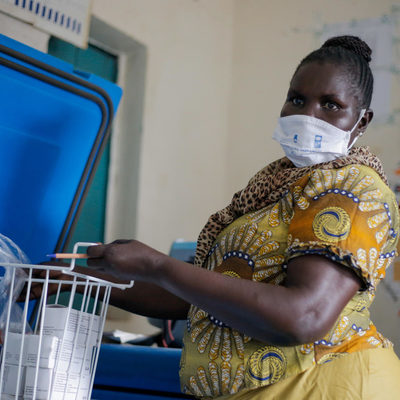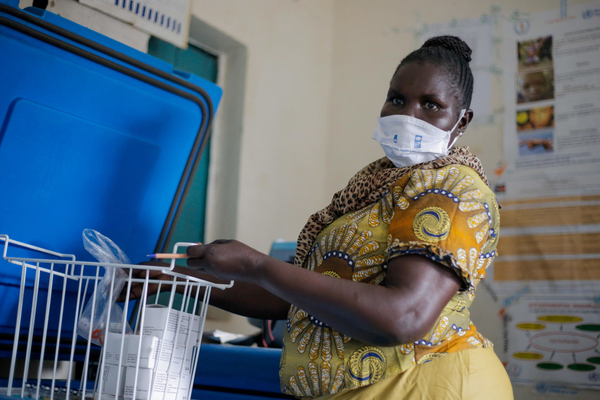“Immunity Inequality” Will Loom Large, If We Let It
The pandemic has shed a light on the disparities in immunization inequality, an issue that will continue to persist if we refuse to take action now.

“Bill and I are deeply concerned, though, that in addition to shining a light on so many old injustices, the pandemic will unleash a new one: immunity inequality, a future where the wealthiest people have access to a COVID-19 vaccine, while the rest of the world doesn’t.” -Melinda Gates
The safe and equitable distribution of all vaccines–from COVID-19 to our four focus diseases–is at the forefront of Shot@Life’s mission to ensure every child has a shot at a healthy and productive life. Even before the COVID-19 pandemic disrupted our reality, Shot@Life has been working to give children around the world access lifesaving vaccines.
Shining a Spotlight on Immunity Inequality
In many ways, the COVID-19 pandemic brought the world together. Our reality in lockdown, wearing masks, and mourning loss became universal. From Kenya to Thailand, we learned to sing “Happy Birthday” while washing our hands for 30 seconds. As the pandemic progressed, we added the vocabulary of global health experts like “herd immunity” to our own daily conversations.
As Melinda Gates put it, “We all saw firsthand how quickly a disease you’ve never heard of in a place you may have never been can become a public health emergency right in your own backyard. Viruses like COVID-19 remind us that, for all our differences, everyone in this world is connected biologically by a microscopic network of germs and particles—and that, like it or not, we’re all in this together.”
At the same time, the threat of “immunity inequality” has never been more imminent. Between countries, we have seen high-income countries hoard vaccine doses. Immunity inequality increases across lines of race, gender, and urban-rural divides as well, leaving millions of people vulnerable.
A Closer Look at the Numbers
Globally, we have surpassed 100 million cases of COVID-19 and more than 2 million deaths. Since the first case of COVID-19 was first detected in the U.S. on January 21, 2020, several vaccines are now being rolled out to vulnerable populations–a miracle of modern medicine. With other vaccines in the pipeline, we already see an emerging picture of inequitable distribution:
- More than 90% of the countries which are now rolling out vaccines are high- or upper-middle-income countries.
- 75% of vaccine doses administered were in only 10 countries.
- According to a CNN analysis, the U.S. could reach herd immunity (estimated at 75%) by the end of 2021, if vaccination rates increase to 1 million shots a day.
- Meanwhile, low- and middle-income countries expect to immunize 1 in 5 people by the end of 2021.
Though the vaccination rate of 1 million shots a day (the target pace set by President Biden’s “100 million shots in 100 days” plan) is ambitious, and herd immunity rates fluctuate based on new scientific data, it’s clear that the U.S. is well on its way to vaccinating its entire population. Many other countries haven’t even started.
Global Heath Requires Multilateralism

In Juba, South Sudan, nurse and vaccinator Elisabeth Abraham Loro, collects vaccines from a solar-powered refrigerator.
Sharing vaccines equitably is the morally right thing to do. It is also the smart thing to do strategically and economically. As the Gates letter points out, the term “global health” has rarely referred to the health of the global population. In practice, “people in rich countries used this term to refer to the health of people in non-rich countries. A more accurate term probably would have been ‘developing country health.'”
As we now know intimately, however, infectious diseases don’t stop at country borders. This means ending a global pandemic requires global cooperation.
Equitable vaccine access is the only way to mitigate the public health and economic impact of the pandemic. Specifically, this means protecting frontline healthcare workers and those most at risk wherever they are, and whatever their income level. Efforts like the COVAX Facility are essential, working to deliver on the goal of 2 billion doses to 92 low- and middle-income countries by the end of 2021.
We applaud the U.S. Administration’s recent decision to set aside $4 billion for Gavi, the Vaccine Alliance. Ultimately, ending the pandemic requires all stakeholders to commit to the shared vision of rapid, global equitable access. Only then, can we restore the progress made against other vaccine-preventable diseases and prevent the next pandemic.
Want to stand up for the equitable distribution of vaccines around the world? Attend an upcoming Champion training to learn how you can advocate with Shot@Life.
